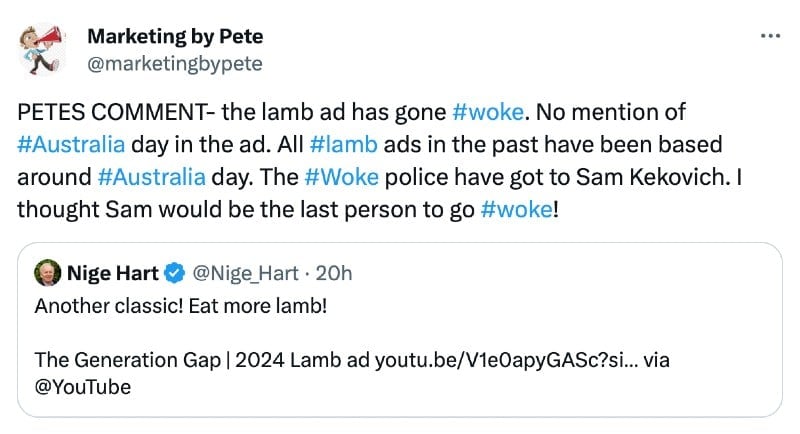An annual advertising campaign urging people to eat lamb seems an unlikely icon, yet Meat & Livestock Australia’s (MLA) summer lamb campaign continues to hit the spot for consumers.
First launched in 2005, the campaign was fronted by former AFL player and media personality Sam Kekovich. The ad, created by BMF, played on Kekovich’s reputation for delivering deadpan rants to the camera, by having him do just that – deliver a rant to the camera about eating lamb for Australia Day.
The first “Lambassador” spot aimed to end the declining sales of lamb, which it successfully achieved while also creating a hugely popular platform and formula for success.
The first spot, however, was not without its controversy. Kekovich skewered vegetarians as un-Australian for not eating lamb. It triggered a surge of complaints and ensured the second pillar of the campaign’s formula: controversy.
Now in its nineteenth year, beloved “Lambassador” Kekovich has returned once again to front the latest summer Lamb campaign, “Generation Gap,” via The Monkeys, part of Accenture Song.
Graeme Yardy, domestic market manager at Meat & Livestock Australia (MLA), told Mediaweek the secret sauce continues to lie in the power of playful provocation.
“I think there’s a difference between controversy and provocation. For me, provocation is the sweet spot,” said Yardy.
The latest tongue-in-cheek campaign plays on stereotypical generational divides in Australia, championing lamb as the unifying force that bridges the gap.
See also: Sam Kekovich hosts ‘BBQ for the ages’ in summer lamb campaign for MLA
“We want to make people think and question. That’s more worthy. I think controversy is just to try and get eyeballs. We want to actually engage people and make people think about the national conversation or values.
“By bringing them into that and then resolving it with the brand, bringing everyone together with lamb, that’s where we get the brand pay-off, and it’s a model that works really well.”
The MLA has spent time contemplating the line between mischievous and scandalous since the first summer lamb ad was launched. The organisation have faced the pointy end of the news cycle and attracted a significant share of complaints to Ad Standards in its time.
Vegetarians, vegans and other “un-Australian” targets have been outraged over the years; the 2016 campaign attracted more than 400 complaints for depicting “racial insensitivity” and violence towards vegans.
The following year seemed to double down on the controversy by tackling the issue of Invasion Day for the summer lamb campaign and then depicting various denominational Gods – including Indian vegetarian god Ganesha – enjoying a lamb meal together for the winter lamb ad “You Never Lamb Alone” campaign.
Since then, it appears MLA has refined its model, with Yardy attesting to a robust, cross-generational focus group strategy to hone their script. The annual campaign has also notably distanced itself from its historical association with Australia Day, rather pivoting to the less controversial “Summer lamb ad” label.
“Something we know is that each year people get passionate about the Australian identity, society, values,” Yardy explained.
He continued, “Australia evolves every year. We’ve changed in the time that we’ve been doing this.
“So it becomes this very evergreen piece around how we’re changing or evolving, what does that mean?”
The moves, however, have some naysayers criticising the ad, co-directed by Trent O’Donnell and Aimée-Lee Xu Hsien, for pandering to “woke” culture.

@marketingbypete on X (formerly Twitter) claims the ad is catering to “woke” culture
But Yardy argued the ad is merely meeting the public where their consciousness already exists.
“We try to work through what the conversation is for the broad majority of Australians. Yes, what’s in the media, but also, what people really are passionate about.”
“That’s ultimately what you want to create in any sort of advertising or communication, is relevance and topicality,” he added.
Further, Yardy argues the ad achieves its goals by poking fun at every generation, equally, in a way that regards the importance of self-effacing humour in Australian culture. “There’s something about Australians: we love laughing at ourselves.
“This is not about putting shade on any one generation, this is about laughing at ourselves and the ridiculousness of things. I think that’s one of our great qualities as a country that we do that really well.”

